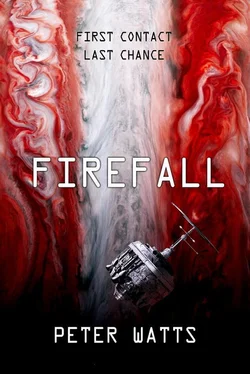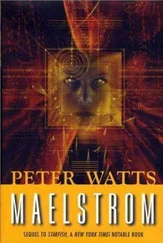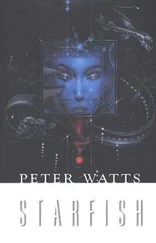Maybe the Singularity happened years ago. We just don’t want to admit we were left behind.
ALL KIND OF ANIMALS COMING HERE. OCCASIONAL DEMONS TOO.
—IAN ANDERSON,
CATFISH RISING
THE THIRD WAVE, they called us. All in the same boat, driving into the long dark courtesy of a bleeding-edge prototype crash-graduated from the simulators a full eighteen months ahead of schedule. In a less fearful economy, such violence to the timetable would have bankrupted four countries and fifteen multicorps.
The first two waves came out of the gate in even more of a hurry. I didn’t find out what had happened to them until thirty minutes before the briefing, when Sarasti released the telemetry into ConSensus. Then I opened wide; experience flooded up my inlays and spilled across my parietal cortex in glorious high-density fast forward. Even now I can bring those data back, fresh as the day they were recorded. I’m there .
I’m them .
I am unmanned. I am disposable. I am souped-up and stripped-down, a telematter drive with a couple of cameras bolted to the front end, pushing gees that would turn meat to jelly. I sprint joyously toward the darkness, my twin brother a stereoscopic hundred klicks to starboard, dual streams of backspat pions boosting us to relativity before poor old Theseus had even crawled past Mars.
But now, six billion kilometers to stern, Mission Control turns off the tap and leaves us coasting. The comet swells in our sights, a frozen enigma sweeping its signal across the sky like a lighthouse beam. We bring rudimentary senses to bear and stare it down on a thousand wavelengths.
We’ve lived for this moment.
We see an erratic wobble that speaks of recent collisions. We see scars—smooth icy expanses where once-acned skin has liquefied and refrozen, far too recently for the insignificant sun at our backs to be any kind of suspect.
We see an astronomical impossibility: a comet with a heart of refined iron.
Burns-Caufield sings as we glide past. Not to us; it ignores our passage as it ignored our approach. It sings to someone else entirely. Perhaps we’ll meet that audience some day. Perhaps they’re waiting in the desolate wastelands ahead of us. Mission Control flips us onto our backs, keeps us fixed on target past any realistic hope of acquisition. They send last-ditch instructions, squeeze our fading signals for every last bit among the static. I can sense their frustration, their reluctance to let us go; once or twice, we’re even asked if some judicious mix of thrust and gravity might let us linger here a bit longer.
But deceleration is for pansies. We’re headed for the stars .
Bye, Burnsie. Bye, Mission Control. Bye, Sol.
See you at heat death.
* * *
Warily, we close on target.
There are three of us in the second wave—slower than our predecessors, yes, but still so much faster than anything flesh-constrained. We are weighed down by payloads which make us virtually omniscient. We see on every wavelength, from radio to string. Our autonomous microprobes measure everything our masters anticipated; tiny onboard assembly lines can build tools from the atoms up, to assess the things they did not. Atoms, scavenged from where we are, join with ions beamed from where we were: thrust and materiel accumulate in our bellies.
This extra mass has slowed us, but midpoint braking maneuvers have slowed us even more. The last half of this journey has been a constant fight against momentum from the first. It is not an efficient way to travel. In less-hurried times we would have built early to some optimal speed, perhaps slung around a convenient planet for a little extra oomph , coasted most of the way. But time is pressing, so we burn at both ends. We must reach our destination; we cannot afford to pass it by, cannot afford the kamikaze exuberance of the first wave. They merely glimpsed the lay of the land. We must map it down to the motes.
We must be more responsible .
Now, slowing towards orbit, we see everything they saw and more. We see the scabs, and the impossible iron core. We hear the singing. And there, just beneath the comet’s frozen surface, we see structure : an infiltration of architecture into geology. We are not yet close enough to squint, and radar is too long in the tooth for fine detail. But we are smart, and there are three of us, widely separated in space. The wavelengths of three radar sources can be calibrated to interfere at some predetermined point of convergence—and those tripartite echoes, hologramatically remixed, will increase resolution by a factor of twenty-seven.
Burns-Caulfield stops singing the moment we put our plan into action. In the next instant I go blind.
It’s a temporary aberration, a reflexive amping of filters to compensate for the overload. My arrays are back online in seconds, diagnostics green within and without. I reach out to the others, confirm identical experiences, identical recoveries. We are all still fully functional, unless the sudden increase in ambient ion density is some kind of sensory artefact. We are ready to continue our investigation of Burns-Caulfield.
The only real problem is that Burns-Caulfield seems to have disappeared…
* * *
Theseus carried no regular crew—no navigators or engineers, no one to swab the decks, no meat wasted on tasks that machinery orders of mag smaller could perform orders of mag better. Let superfluous deckhands weigh down other ships, if the nonAscendent hordes needed to attach some pretense of usefulness to their lives. Let them infest vessels driven only by commercial priorities. The only reason we were here was because nobody had yet optimized software for First Contact. Bound past the edge of the solar system, already freighted with the fate of the world, Theseus wasted no mass on self-esteem.
So here we were, rehydrated and squeaky-clean: Isaac Szpindel, to study the aliens. The Gang of Four—Susan James and her secondary personae—to talk to them. Major Amanda Bates was here to fight, if necessary. And Jukka Sarasti to command us all, to move us like chess pieces on some multidimensional game board that only vampires could see.
He’d arrayed us around a conference table that warped gently through the Commons, keeping a discreet and constant distance from the curved deck beneath. The whole drum was furnished in Early Concave, tricked unwary and hung-over brains into thinking they were looking at the world through fisheye lenses. In deference to the creakiness of the nouveaux undead it spun at a mere fifth of a gee, but it was just warming up. We’d be at half-grav in six hours, stuck there for eighteen out of every twenty-four until the ship decided we were fully recovered. For the next few days, free-fall would be a rare and blesséd thing.
Light sculptures appeared on the tabletop. Sarasti could have fed the information directly to our inlays—the whole briefing could have gone through ConSensus, without the need to assemble physically in the same place—but if you want to be sure everyone’s paying attention, you bring them together.
Szpindel leaned in conspiratorially at my side. “Or maybe the bloodsucker just gets off seeing all this meat in close quarters, eh?”
If Sarasti heard he didn’t show it, not even to me. He pointed to a dark heart at the center of the display, his eyes lost behind black glass. “Oasa object. Infrared emitter, methane class.”
On the display it was—nothing. Our apparent destination was a black disk, a round absence of stars. In real life it weighed in at over ten Jupiters and measured twenty percent wider at the belly. It was directly in our path: too small to burn, too remote for the reflection of distant sunlight, too heavy for a gas giant, too light for a brown dwarf.
Читать дальше








